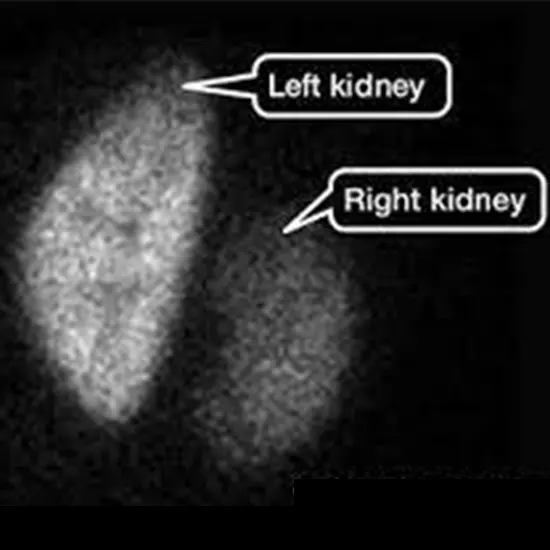
Nuclear medicine's DMSA renal scan provides specialists with in-depth images of the kidneys. Dimercapto succinic acid (DMSA) is a transient radioisotope that enters the body through the kidneys and is only radioactive for a few hours. Nuclear medicine specialists can view the kidneys and identify issues at their earliest stages using DMSA and a specialized camera. Nuclear medicine exams employing radioisotopes like DMSA have about the same amount of radiation as other radiology exams, although slightly different from conventional X-rays and CT scans.
* Kidney scaring
* Reflux-associated nephropathy
* No additional preparation for this procedure. No fasting is required for your child unless sedation medication has been prescribed.
* Your child must wear comfortable and loose-fitting clothes for the procedure
* Bring comfort items such as a stuffed animal or blankie for your child to hold during the procedure.
* You can bring a portable music player to distract the child and lie still during the procedure
* There are two stages to the scan.
* You will receive a tiny injection of a radioactive tracer for the first segment. No change in how you feel will result from this injection. The camera can observe the kidneys thanks to this injection.
* Three hours following the injection time, the technologist will assign you a time to come back to the office. When you come back for the second part, you'll be positioned in front of the scanning camera while photos are taken for 30 minutes. Because movement will cause the images to blur and lower the scan's quality, you must remain as still as possible throughout this period.
* Your body excretes the radioactive substance you get through your urine. Because of this, you should hydrate well and urinate frequently after the injection. Depending on the person, the amount of fluid needed may vary, but you should be well hydrated, which for an adult could be 3 to 4 glasses of water. A DMSA scan won't change the hue of your urine. However, it is advised that you thoroughly wash your hands after using the restroom because it contains radioactive tracer.
* There will be a small quantity of radioactivity in the urine and consequently on the child's diaper when newborns and young children in nappies are having a DMSA scan. The radiotracer won't harm the baby's skin, but caregivers should wash their hands properly and the baby's bottom as usual. Disposable diapers should be placed in a plastic bag and sealed before being disposed of, while cloth diapers should be carefully cleaned.
WRITTEN BY
SIMRAN KAUSHAL
NUCLEAR MEDICINE TECHNOLOGIST